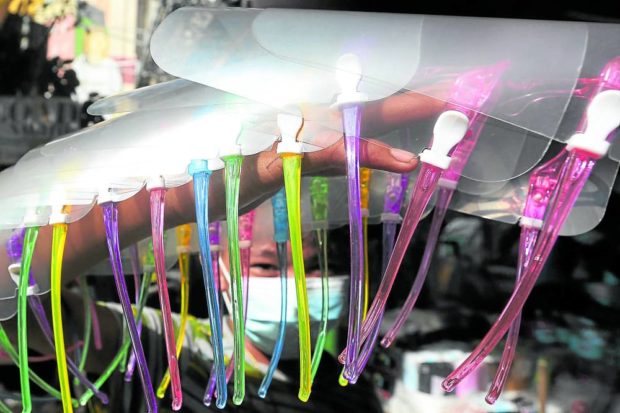
FACE UP: This young vendor in Pasay City may need to think of a new ware to sell since the government is lifting the requirement on face shields in areas under Alert levels 3, 2, and 1. (Photo by MARIANNE BERMUDEZ / Philippine Daily Inquirer)
MANILA, Philippines — Netizens on Tuesday welcomed the government’s decision to drop the public use of face shields in areas under certain alert levels, describing these as an “icon of corruption” during the pandemic.
Kevin Ganchero, a lawyer and commuter based in Makati, said face shields had been “ineffective, overpriced” and contributed to plastic waste.
“We were forced to wear it and pay P20 for a useless item. It’s more expensive than a face mask. But now we have no choice but to throw them away,” Ganchero said.
More than a year after face shields were required in public transport, the Department of Transportation on Tuesday said the wearing of face shields in trains, buses, jeepneys, and other public utility vehicles in low-risk areas will no longer be mandatory.
Now voluntary
In a separate advisory, the MRT 3 management said that wearing face shields inside its trains is now voluntary.
This after President Rodrigo Duterte approved the recommendation of the Inter-Agency Task Force for the Management of Emerging Infectious Diseases (IATF) to make the use of face shields voluntary in areas under Alert Levels 3, 2, and 1.
Executive Secretary Salvador Medialdea, in a Nov. 15 memorandum, said face shields would only be required in areas under Alert Level 5 or granular lockdown. For areas under Alert Level 4, local government units (LGUs) and private establishments have the discretion to require face shield use, he said.
It is also up to LGUs to decide on face shield use in areas that are still under community quarantine classifications instead of alert levels, except for areas under enhanced community quarantine and granular lockdowns where face shields will be mandatory.
Many commuters in Metro Manila, however, were still seen wearing their face shields to work a day after the Palace directive to discard them.
Nuisance
Although her boss had staunchly advocated against the use of face shields, Florence Jose, a marketing professional in Taguig City, said they were still required to wear face shields inside their office building.
She said the building management would still have to release an official memorandum that face shields would not be required at work.
The Department of Education also said on Wednesday that students participating in the pilot implementation of in-person classes would no longer be required to wear face shields.
At a press briefing, Education Secretary Leonor Briones underscored that the face shields could become a nuisance to the kids, especially since these do not fit their faces.
“The [IATF] has spoken … children might consider it a nuisance because they are already wearing masks then there’s the face shield. So that’s voluntary,” she said.
Briones noted that even the adults were not wearing the face shields properly.
“How much more the children? It may not serve the purpose that we want,” she said.
The decision to limit face shield use comes after a clamor from the public and some local government officials to remove the requirement, which they said was an inconvenience as well as an added financial burden.
They also questioned the efficacy of face shields in offering added protection against the coronavirus on top of the use of face masks.
Recycle
As he approved the decision to limit face shield use, Duterte reminded the public to keep on wearing their face masks as the pandemic was far from over.
“You dispense with the shield but not the mask. The mask will forever remain and it will be a part of our day-to-day, part of … the safety measure because the airborne virus will be here for a long time,” Duterte said in his public address on Monday.
But the country’s environmental managers urged the public not to throw out the face shields just yet.
During a joint press conference, the Department of Environment and Natural Resources (DENR) and the National Solid Waste Management Commission (NSWMC) sought to allay concerns that the new directive would cause a surge in plastic waste across the country. The DENR estimates that there are around 65 million face shields currently in use.
But “based on our (assessment) there is nothing to be alarmed of because while we hope that Covid-19 will not worsen in the future, there is still a thinking that (the face shields) would still be used again in the future,” Undersecretary Benny Antiporda said.
“If we can keep it, let’s keep it because COVID-19 is not going away soon,” said NSWMC Vice Chair Crispian Lao. “Better if you use it if you can or you can recycle the face shields.”